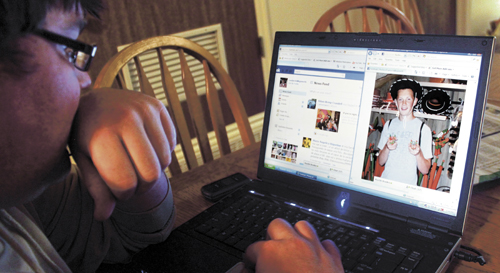Becoming part of the social network
According to the Facebook and MySpace websites, users log more than 708.2 billion minutes per month on their social network of choice. This translates to over one million years each month, spread across more than 622 million active users.
Besides Facebook and MySpace, networks like Blogger, WordPress, Twitter, instant messaging and text messaging make communication instantaneous.
Preston Parker, lecturer in the journalism and communications department and president of the Social Media Club of Cache Valley, said in the last seven years, starting with Napster and blogging, social networking has created a way for someone to have a complete online profile.
All of their “sub-networks” are linked together at one hub, which can be controlled from any internet connection.
“You can literally at any time have access to your network,” he said. “Before, how would you have done that?”
The influx of social networking and the development of smart phones and text messaging services are making multitasking an almost necessary skill.
Eddy Berry, assistant department head for sociology, social work and anthropology, said she sees an ever-growing amount of multitasking in the classroom.
“Students are texting, Facebooking and, allegedly, listening to lecture, but I can tell a difference,” Berry said.
According to an MSNBC article, “Why you can’t do three things at once,” the part of the brain that controls multitasking is the medial prefrontal cortex, which can separate two tasks at a time.
In the article, researcher Etienne Koechlin of the Université Pierre et Marie Curie in Paris, France, said this allows us to cook while talking on the phone.
But, if a third task is thrown in, things can get “muddled.” In a classroom, that means less concentration and less retention of information.
Parker said he has also seen a definite increase in technological multitasking in the classroom. Because Parker allows his students to use their various technological mediums in class, he said he has to live with students typing and texting during his lectures.
“Quite frankly,” he said, “if my class is that boring that they’d rather be posting on Facebook or texting, that’s my problem.”
Though he doesn’t mind technology in the classroom, Parker said he doesn’t appreciate it in a conversation, such as someone texting while talking.
“If it’s not an emergency, it’s going to be there later,” he said. “Have a real relationship with people.”
There are two kinds of social network users, Berry said: cosmopolites and localites. Cosmopolites, she said, are the first adopters and those “more focused at the world, global, international politics and goings on.” Localities tend to be more focused on what’s happening locally.
Rich Cromwell, a junior in biology, might be considered a localite. Cromwell belongs to a minority on campus: those who don’t have a Facebook account.
“There are so many other ways to talk to people,” he said. “All my friends are close enough that I don’t need to post about my day to talk to them.”
Cromwell, now married, said that not using Facebook or other social networking sites didn’t hurt him while still dating.
“All my dates were people I’d met somewhere and asked out,” he said. “I just called them if I wanted to talk to them. Facebook wasn’t a factor.”
His wife, on the other hand, does use Facebook.
“I make fun of her every single day,” Cromwell said. “She’s always on that thing.”
Twitter, one of the more recently popular social networks, allows its users to send updates to their followers, either online or through text.
The Pew Research Center in 2009 found that nearly one in five American adults, ages 18 to 24 (about 19 percent) have used Twitter.
Among these users are Paris Hilton, Lindsay Lohan, Sarah Palin and Barack Obama. Though he is without Facebook, Cromwell said Twitter seems like a fun idea, to a point.
“It’s a lot like Facebook,” he said, “but not as personal. It’s cool as long as you get the right people.”
Parker said the interesting aspect of social networking is how it has taken power away from large conglomerates, such as Disney, CBS, Time Warner, etc.
By giving consumers the ability to decide what is important to them, Parker said the role of the information gatekeeper has shifted.
“Now, who is the gatekeeper? I am,” he said. “I get to decide what’s important. I do that by controlling who’s in my network.”
– k.vandyke@aggiemail.usu.edu

